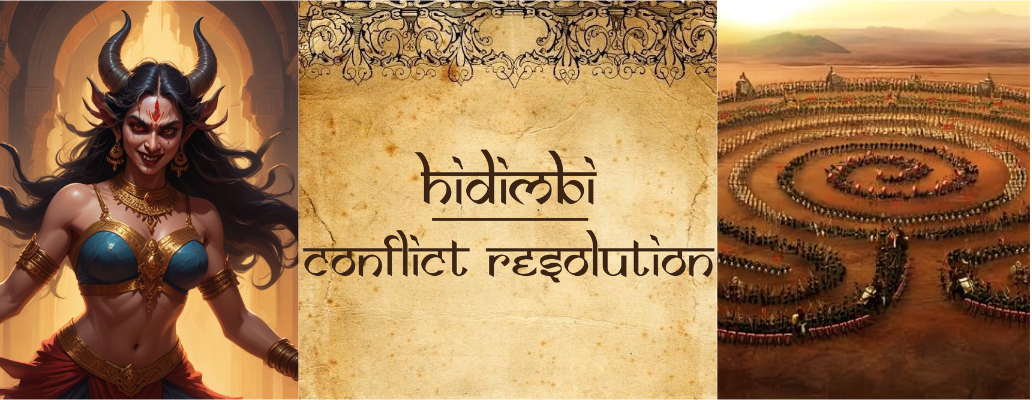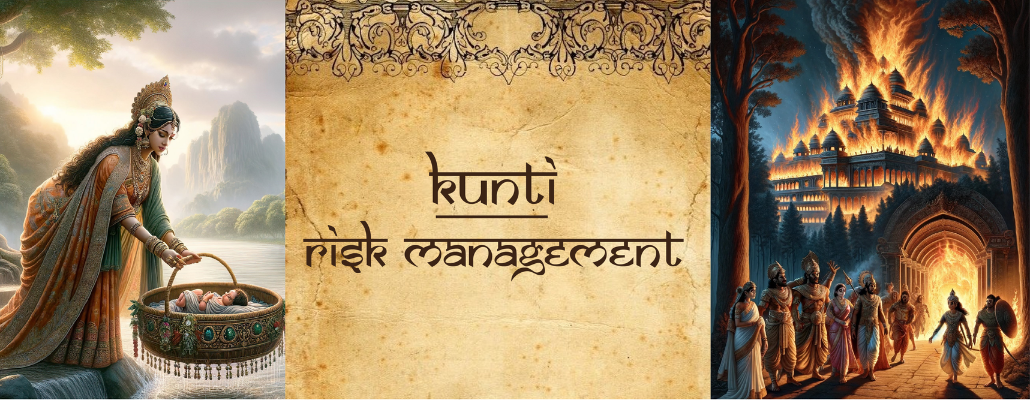

Ancient wisdom for modern businesses
Rooted in time when Dharma and Karma were the leading principles, a war was fought to establish righteousness. Amidst the clash of warriors and thundering cries the voice of women stand out teaching us business administration lessons from ancient incidents. The flame haired Draupadi whose voice raised a tempestuous storm, the matriarch of Pandavas who took calculated steps protecting her family. A queen whose silence echoed sacrifices made in the name of duty. Each teaches us lessons ranging from strategic leadership to ethical diplomacy. Learn 5 very crucial business administration lessons for modern business from the tales you already know.

Leadership
Thousands and Thousands of years ago marked the beginning of the most devastating war, teaching lessons of business administration for years to learn by. Yagyaseni Draupadi, a wife, a mother, a daughter, a daughter-in-law, a sister, a friend, a queen but most importantly a woman humiliated in the presence of her five husbands and a court full of powerful men who called themselves the protectors of dharma.
Dyuta (Dice game) a game where Yudhisthira gambles away everything, his kingdom, himself and even draupadi serves as one of the compelling narratives indicating Draupadi’s resilience and decisiveness. Draupadi despite being the subject of mockery, humiliation exhibits remarkable composure. Later, questioning the legitimacy of Yudhisthira’s wager, she asserts her rights as a woman of honor. She questions their silence in the face of injustice. Each time it is her plight which serves as a catalyst igniting their sense of honor and duty. Likewise, business administration requires individuals who are courageous yet composed, who are resilient yet decisive, inspiring the workforce in their team. A leader should also be empathetic fostering inclusivity and promoting positive organizational culture.

Strategic Planning
Ages before the tale of destruction, began a story in the land of wise! Amba, Princess of Kashi, abducted as a prized possession by the most revered men of Mahabharata, Bhishma. Separated by the love of her life dedicates her life to revenge. Performing austerities, killing herself and being reborn as Shikandi. A warrior less spoken of!
Amba, reincarnated as Shikhandi despite facing numerous social obstacles was one of the seven Akshauhinis of the Pandava army. Recognizing Bhishma's vow of not raising weapons against women, Shikhandi strategically positions herself alongside Arjuna foreseeing Bhishma’s hesitancy to attack. As the battle ensues, Bishma is in a dilemma bound by his code of honor. Seeing Bhishma in his psychological vulnerability, Shikandhi confronts him. Shikhandi by making complete use of her unique identity and opponents weakness exhibits strategic thinking and practical acumen ultimately leading to Pandavas success. Similarly in business administration, leaders must have a strong understanding of the competitive landscape, market trends and industry dynamics to make informed business decisions and stay ahead of the competitors.

Conflict Resolution
Women who disgraced the Rakshasa clan, the mother of Gatotkacha, the accepted wife of Bhima. Bhima who after the birth of their son abandons her to the forest. Dedicating herself to love and righteousness see her ascend as goddess!
Hidimbi, a rakshasi, sister of Hidimba encounters Pandavas as they take refuge in forest escaping Lakshagraha. Hidimbi, attracted by Bhima’s strength approaches him with the intention of wooing him and his brothers as feast for Hidimba. After seeing Bhima’s bravery she recognises the possibility of cooperation seeking to resolve the conflict peacefully. Rather than submitting to violence and aggression like her brother, Hidimbi proposes a mutually beneficial solution addressing the needs of both the parties. Despite being from Rakshasa’s clan, she demonstrates desire for greater good and peaceful coexistence. She shows how conflict can be resolved when there is mutual respect and understanding. In the same way, in business administration, business leaders must always look out for common ground or mutually beneficial solutions exemplifying the importance of dialogue, collaboration, negotiation and strategic partnership leading to a harmonious and productive workplace.

Ethical Leadership
Queen of Hastinapur, wife of Dhritarashtra. She who with dignity and unyielding principles weaves the threads of duty, devotion and destiny forgives her physical sight and embracing darkness discovers the deeper truths governing human existence.
Gandhari voluntarily chooses to blindfold herself after learning that her husband was born blind. Despite having the option to enjoy sight she chooses to build solidarity with her husband effectively showcasing her innate devotion. In the business administration context, it is required that leaders must possess and practice empathy and accountability even if it entails personal sacrifices or difficult decisions. Gandhari’s decision serves as a timeless example exhibiting selflessness to emulate in both personal and professional spheres.

Risk Management
The one gifted with beauty and character yet behind the mask lies a woman burdened by the weight of her choices, haunted by the echoes of sacrifices made in the name of duty. She is the unseen architect taking calculated risks.
Kunti during the war of Mahabharata realizes the threat Karna poses to Pandavas. She aims to mitigate this threat by revealing to him that he is her firstborn son. Thus, she asks Karna to remove his kavachas and kundalas anticipating the potential repercussions. Similarly in business administration risk management involves identifying potential risks such as market competitions and economic downturns while also realizing opportunities of growth and innovation.

Samapanam
The female leads of the Mahabharata offer invaluable lessons in business administration that transcend time and cultural boundaries. By drawing inspiration from these legendary characters, modern business administration leaders can cultivate leadership qualities rooted in empathy, resilience, and strategic acumen, thus paving the way for success in the dynamic landscape of today's corporate world.

